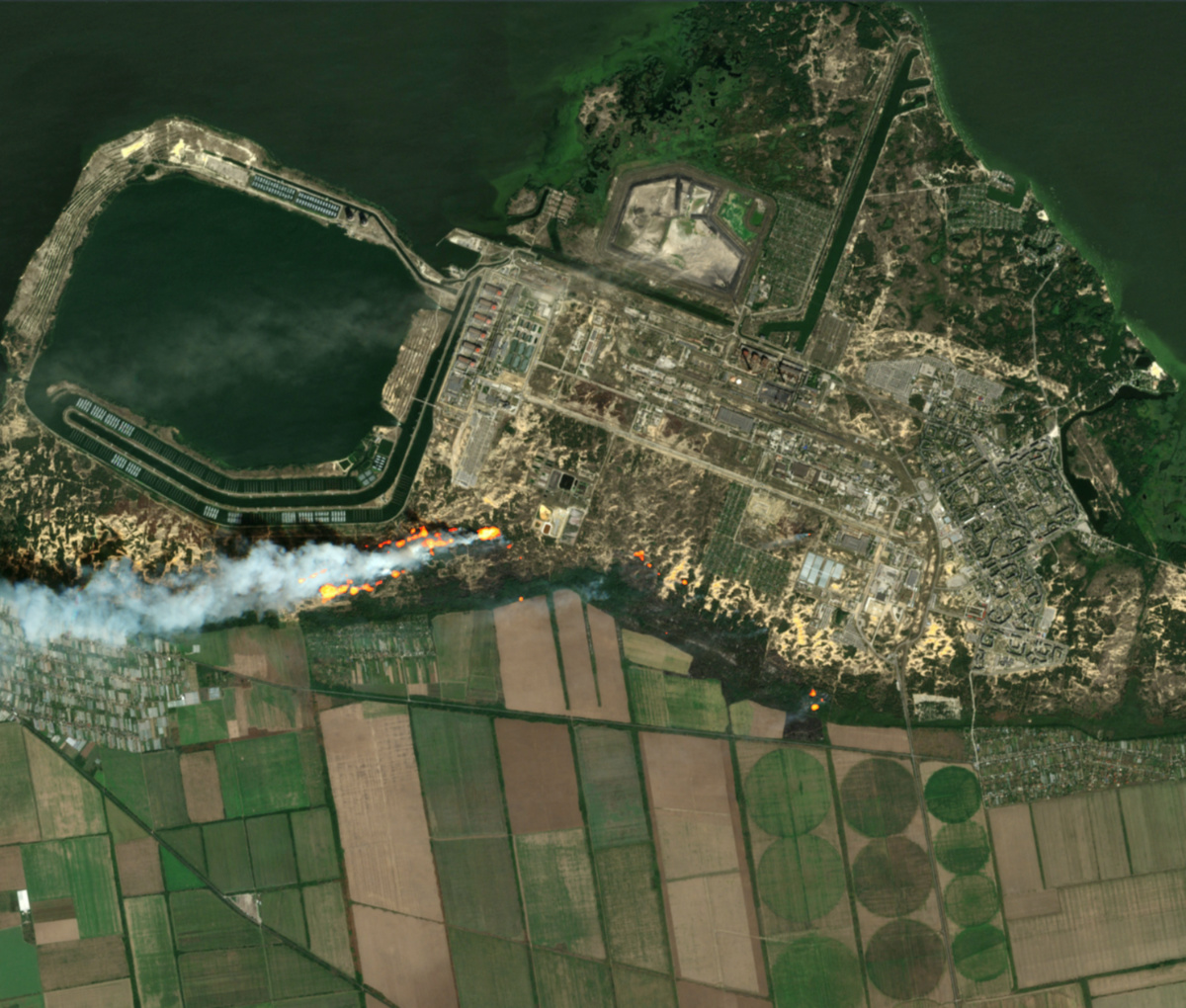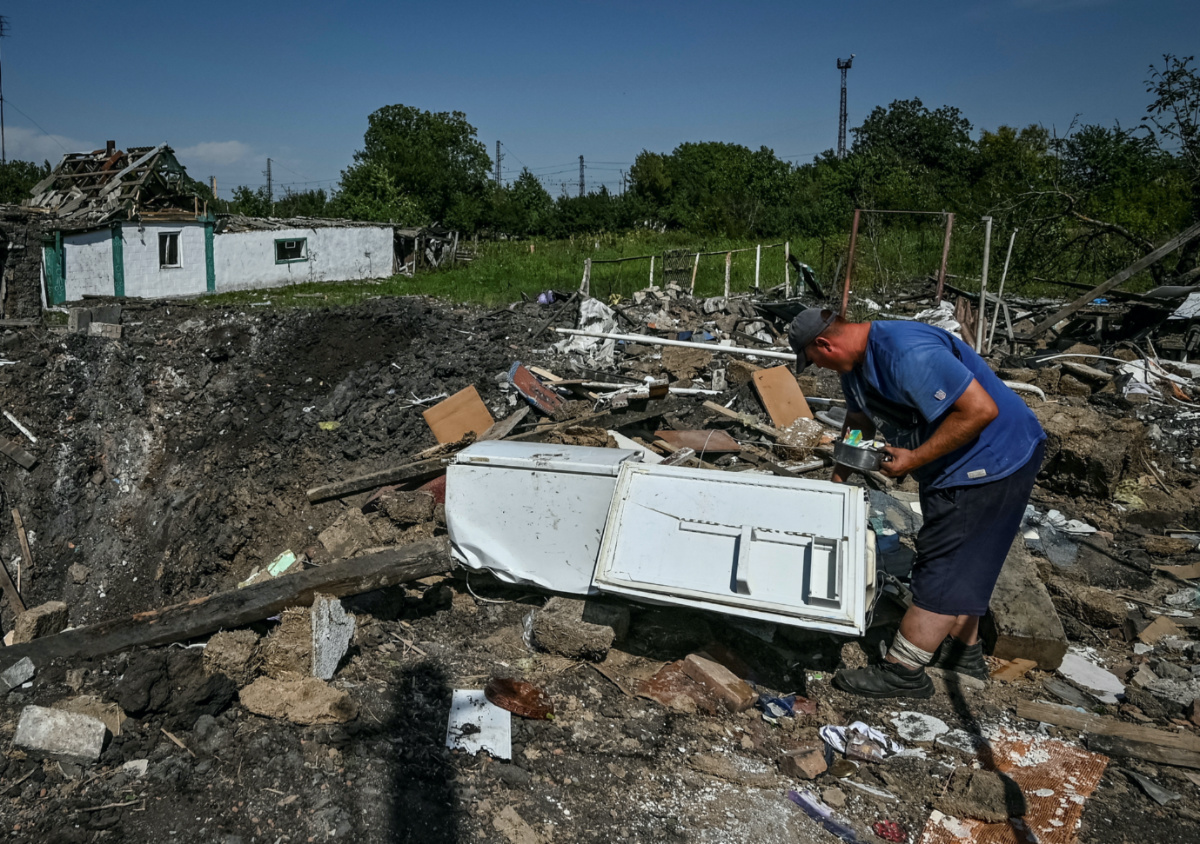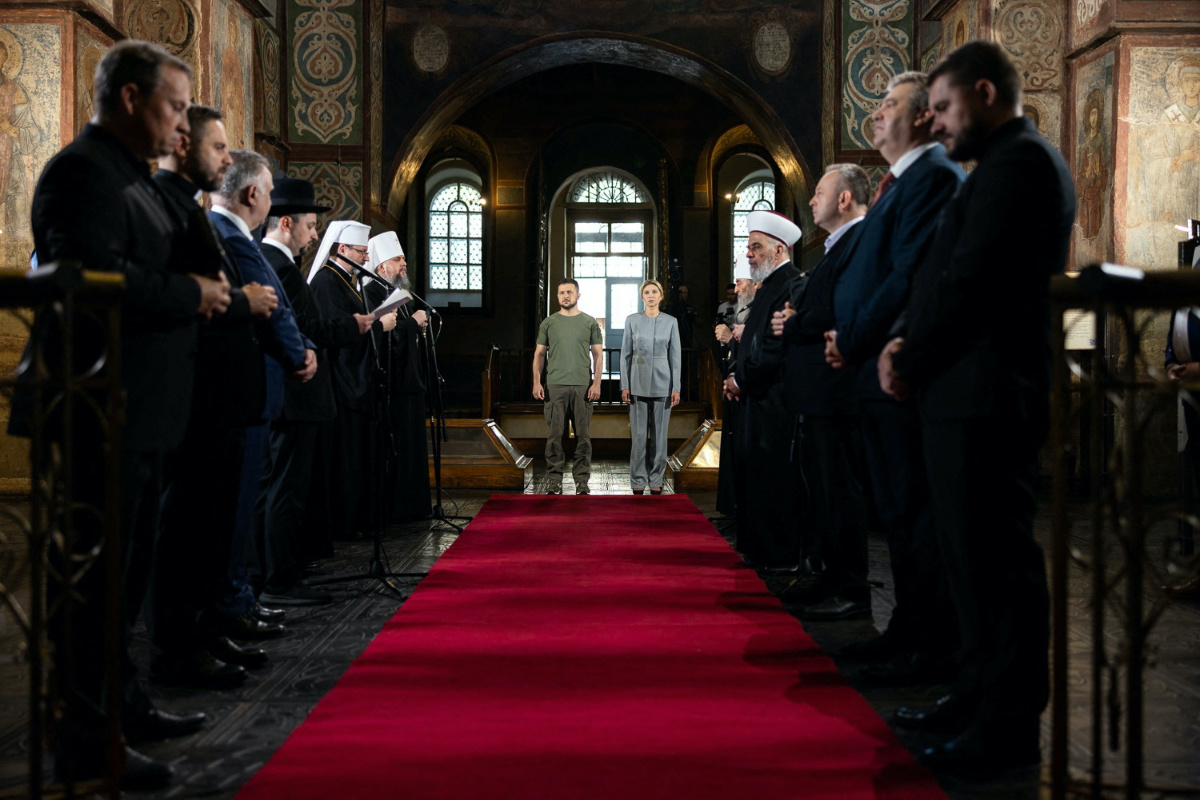President Volodymyr Zelenskiy said the world narrowly avoided a radiation disaster on Thursday as the last regular line supplying electricity to Ukraine’s Russian-held Zaporizhzhia nuclear power plant was restored hours after being cut.
Zelenskiy blamed shelling by Russia’s military for fires in the ash pits of a nearby coal power station that disconnected the reactor complex, Europe’s largest such facility, from the power grid. He said back-up diesel generators had started to ensure power supply and keep the plant safe.
“If our station staff had not reacted after the blackout, then we would have already been forced to overcome the consequences of a radiation accident,” he said in an evening address. “Russia has put Ukraine and all Europeans in a situation one step away from a radiation disaster.”

Overview of Zaporizhzhia nuclear power plant and fires, in Enerhodar in Zaporizhzhia region, Ukraine, on 24th August. PICTURE: European Union, Copernicus Sentinel-2 imagery/Handout via Reuters.
International Atomic Energy Agency officials should be given access to the site within days, he said, “before the occupiers take the situation to the point of no return.”
Ukrainian state nuclear company Energoatom said it had been the first complete disconnection in the plant’s history. Electricity is used for cooling and safety systems.
Russia, which invaded Ukraine in February, captured the plant in March and has controlled it since, although Ukrainian technicians still operate it.
Russia and Ukraine have accused each other of shelling the site, fuelling fears of a nuclear disaster.
Nuclear experts have warned of the risk of damage to the plant’s spent nuclear fuel pools or its reactors. Cuts in power needed to cool the pools could cause a disastrous meltdown.
The United Nations is seeking access to the plant and has called for the area to be demilitarised. IAEA officials are “very, very close” to being able to visit Zaporizhzhia, agency Director-General Rafael Grossi said on Thursday.
Ukraine’s energy minister said agency officials could travel to the plant in the coming days.
“Definitely no later than the beginning of September,” German Galushchenko told Reuters in Kyiv.

A local resident picks up food from the fridge near his house, destroyed by yesterday’s Russian military strike, as Russia’s attack on Ukraine continues, in Chaplyne, Dnipropetrovsk region, Ukraine, on 25th August. PICTURE: Reuters/Dmytro Smolienko
As the war entered its seventh month, Russia said its forces had struck a railway station in eastern Ukraine the previous day, confirming an attack which Kyiv says also hit a residential area and killed 25 civilians as the nation marked its Independence Day.
The Russian Defence Ministry said an Iskander missile had hit a military train at Chaplyne station that had been set to deliver arms to Ukrainian forces on frontlines in the eastern Donbas region.
Ukrainian officials said 21 people were killed when the railway station was hit and five train carriages went up in flames, and a boy died when a missile struck his home in the vicinity. The death toll rose to 25 on Thursday after three more bodies were retrieved from rubble, they said.
The Russian ministry said 200 Ukrainian military personnel had died in the attack. Moscow denies targeting civilians and has said rail infrastructure is a legitimate target since it serves to supply Ukraine with Western weapons.
Reuters was unable to independently verify the reports.
But the United Nations humanitarian coordinator for Ukraine said she was shocked by the attack, and US Secretary of State Antony Blinken said it “fits a pattern of atrocities”.
We rely on our readers to fund Sight's work - become a financial supporter today!
For more information, head to our Subscriber's page.
Nuclear plant risk
The fighting in the area around the Zaporizhzhia nuclear power station has been a source of concern for weeks.
The complex supplied more than 20 per cent of Ukraine’s electricity needs and its loss would pile new strain on the government.
Russia’s Novosti news agency reported safety systems at Zaporizhzhia were activated on Thursday after power cuts were reported across swathes of Russian-controlled territory.
Russia’s ground campaign has stalled in recent months after its troops were repelled from the capital Kyiv in the early weeks of the invasion.
Russian forces control a swathe of territory in the south along Ukraine’s Black Sea and Sea of Azov coasts, while the conflict has settled into a war of attrition in the Donbas.
In its daily briefing, Russia’s defence ministry said it had destroyed eight Ukrainian warplanes in strikes at air bases in Ukraine’s Poltava and Dnipropetrovsk regions. That would be one of the heaviest losses for Ukraine’s air force in recent weeks.

Ukraine’s President Volodymyr Zelenskiy and his wife Olena Zelenska attend a prayer for Ukraine at St Sophia’s Cathedral to mark the country’s Independence Day, amid Russia’s attack on Ukraine, in Kyiv, Ukraine, on 24th August. PICTURE: Ukrainian Presidential Press Service/Handout via Reuters.
Kyiv has repeatedly called for more, high-grade Western military hardware it says it needs to repel Russian attacks.
Zelenskiy spoke on Thursday by phone with US President Joe Biden, who reiterated US support for Ukraine against Russia, the White House said.
“We discussed Ukraine’s further steps on our path to the victory over the aggressor and importance of holding Russia accountable for war crimes,” Zelenskiy said in on Twitter.
In a move that might bolster Western estimates of heavy Russian losses during the war, President Vladimir Putin signed a decree on Thursday increasing the size of Russia’s armed forces to 2.04 million from 1.9 million.
The Kremlin says its aim is to “denazify” and demilitarise Ukraine and remove perceived security threats to Russia.
That is dismissed by Ukraine and the West as a baseless pretext for a war of conquest that has killed thousands of civilians, displaced millions and left cities in ruins. It has also shaken the global economy, creating shortages of essential foods and sending energy prices soaring.
– With Reuters bureaux






